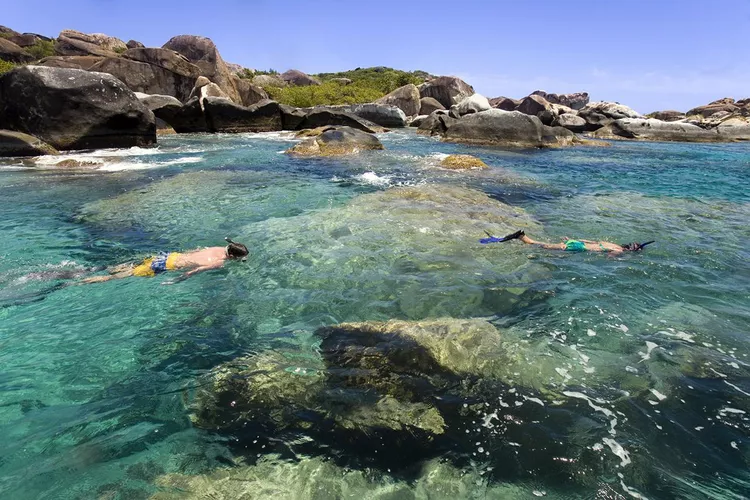Summary of the Natural Wonders of the Caribbean
Awe-Inspiring Nature in the Islands
In a region where the natural beauty of tropical rainforests, pristine beaches, and colorful reefs are among the main attractions, you’ll discover numerous nominees worthy of inclusion in any “best of” list. However, the treasures that comprise this list of Seven Natural Wonders of the Caribbean truly represent the best of the best — those sublime spots where nature has the incredible ability to take your breath away.
The Baths, Virgin Gorda, British Virgin Islands
The Baths is a Caribbean snorkeler’s paradise, characterized by a jumble of ancient underwater boulders that form a series of caves, grottos, and pools along the coast of Virgin Gorda in the British Virgin Islands. Consequently, thanks to the calm and sheltered waters, even novice snorkelers can enjoy the splendor of the coral-kissed rock formations as they paddle from hidden pools right up onto the shoreline. There’s nothing more refreshing than a plunge into the sparkling sea after exploring The Baths’ intricate shore caves — it may take an hour or more of climbing and navigating through the rocks to see them all.
Bioluminescent Bay, Vieques, Puerto Rico
A kayak trip down a narrow mangrove river leads to Vieques’ Bahia Fosforescente, known as Bioluminescent Bay. This unique natural site offers a wonderful experience for visitors to Puerto Rico. Moreover, the bay’s shallow and bacteria-rich waters create an ideal environment for one-celled protozoa that exhibit bioluminescence—an incredible light display that acts as a defense mechanism. In other words, these microorganisms illuminate when disturbed, either by a predator or an enthusiastic swimmer.
On a moonless night, a swim in the bioluminescent bay of Vieques is truly a magical experience, with ripples and waves of light trailing from your paddling arms and moving fingers. If you can’t make it to Vieques, there’s also a bioluminescent bay in Fajardo which can be a suitable alternative.
Bonaire National Marine Park
:max_bytes(150000):strip_icc():format(webp)/bonairemarinepark-56a38f905f9b58b7d0d28bdc.jpg)
Bonaire is renowned as one of the true meccas for scuba buffs and snorkelers. The Bonaire National Marine Park surrounds the entire island, extending from the shoreline to where the water reaches depths of 200 feet. This location is celebrated for having the best-protected reef system in the Caribbean. Human activities, while closely regulated, vary from swimming, kayaking, and windsurfing to diving and snorkeling.
El Yunque Rain Forest, Puerto Rico
:max_bytes(150000):strip_icc():format(webp)/GettyImages-834944558-e911b8d5e2f140fe9e9c16bed766a0f2.jpg)
The Caribbean’s most famous rain forest is also its most beautiful, making it one of the crown jewels of the U.S. National Park Service. This Puerto Rico park spans 28,000 acres and features staggering biodiversity, housing thousands of native plants and hundreds of animal species. With 600,000 annual visitors, El Yunque can sometimes feel quite crowded; however, quieter experiences abound during summer (when locals take refreshing dips in the cool rivers), spring, and fall. You can enjoy hiking, fishing, and even camping to truly immerse yourself in the rainforest experience.
The Pitons, St. Lucia
:max_bytes(150000):strip_icc():format(webp)/GettyImages-640121662-58d12de65f9b581d721ed8c4.jpg)
One of the iconic vistas of St. Lucia and the entire Caribbean, the twin volcanic peaks of the Pitons rise dramatically from the sea. The Pitons Management Area, recognized as a UNESCO World Heritage site, features active hot springs, coral reefs, and lush tropical forests. Adventurous visitors to St. Lucia often embark on the challenging hike to the top of the 2,619-foot Gros Piton (where Petit Piton, at 2,461 feet, remains off-limits to climbers).
Pitch Lake, Trinidad
:max_bytes(150000):strip_icc():format(webp)/GettyImages-146270378-58d12e2c5f9b581d721ed8ec.jpg)
Some refer to the Pitch Lake of Trinidad as the ugliest tourist attraction in the Caribbean. Notably, some visitors have compared its appearance to a giant parking lot. However, this bubbling, hissing, odorous 100-acre lake of liquid asphalt is the largest of its kind in the world and definitely worth a visit. Situated near the town of La Brea, Pitch Lake is around 350 feet deep, and visitors can walk on parts of its crusty surface. Guides will demonstrate how the lake continuously shifts, consuming some objects while extruding others. The lake contains an estimated 6 million tons of asphalt, replenished from pitch veins that run deep beneath the earth’s surface.
Soufriere Hills Volcano, Montserrat
:max_bytes(150000):strip_icc():format(webp)/GettyImages-139819580-58d12ef85f9b581d721ef01c.jpg)
The highly active, occasionally volatile Soufriere Hills volcano in Montserrat has served as both a blessing and a curse for local residents. A significant eruption beginning in 1995 devastated the island, rendering the entire southern half uninhabitable and burying the capital city of Plymouth under tons of ash, tragically resulting in 18 fatalities. However, the volcano remains an alluring draw for visitors, who can observe active eruptions and abandoned structures from a former golf course now blanketed in volcanic mudflows. Additionally, tourists can explore the Montserrat Volcano Observatory, which diligently monitors activity at Soufriere Hills.




